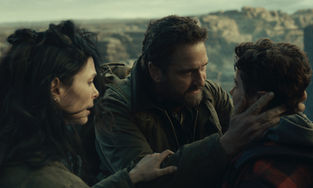'All That’s Left Of You' review: History weighs heavily on your heart | HIFF 2025
- S.J.

- Sep 30, 2025
- 4 min read
Updated: Oct 2, 2025

C'mon, the awful taste was enough when it comes to despising Jaffa Cakes; the unjust history of the city that inspired the name of said British snack was not necessary. Jaffa plays a major part in All That's Left Of You (اللي باقي منك in Arabic), the decades-spanning drama written and directed by Cherien Dabis who is also one of its stars. Following one Palestinian family for 75 years, the story begins in 1948's Mandatory Palestine where family man Sharif (Adam Bakri) is unwilling to leave the family home during intense battles across the city as zionist Israeli forces are trying to defeat the British and Arab forces in order to seize control over the area. His wife Munira (Maria Zreik) and their kids evacuate, the Israeli forces begin to ethnically cleanse Jaffa, and they remove Sharif from the house and place him in a labour (read: concentration) camp, until he finally gets out and reunites with his family.
In 1978, living under occupation in the West Bank, Munira and Sharif's now-adult son Salim (Saleh Bakri) has a family of his own—wife Hanan (Dabis), son Noor (Sanad Alkabareti) and a baby daughter. Elderly Sharif (Mohammad Bakri) lives with them. Noor and Salim's bond is challenged when they're stopped and humiliated by Israeli soldiers on their way home. In 1988, teenage Noor (Muhammad Abed Elrahman) gets shot by Israeli soldiers during a protest. Finally, in 2022, we reconnect with Hanan and Salim as they reflect on their lives.
Admittedly, things get off to a rocky start because there's sort of an in medias res opening and slightly awkward framing in general, and so for a good while you can't help but wonder where the emotional core of the movie is going to lie. This seems like the type of project that was reshuffled quite a bit in the editing bay (editing by Tina Baz) and the shape was ultimately a mystery even for the creatives. Somewhere in there is probably a more effective structure than what ended up on screen, perhaps even one that goes from 2022 to 1948, or one that starts in 1978. That way, each chapter would've revealed layers for each decision made by the family members. As it is, though, the presentation can feel somewhat dry.
Fortunately, Dabis' unsubtle yet thoughtful writing warms up its engines as the story moves along and the ambition and themes start to coalesce with handsome period filmmaking that carries you through some of those rougher patches. The makeup and hair design struggles slightly in terms of aging up characters, but the work is otherwise excellent. But together with Bashar Hassuneh's resourceful production design, Chris Issa and Zeina Soufan's stylish costume design, and especially vibrant locations that allow you to focus on the characters and ideas instead of feeling like you're elsewhere entirely, the different departments are clearly doing a lot with was presumably very little money and time for a period piece. Immersive it very much is.
Dabis' script hits its stride with the aforementioned scene where Noor and Salim are stopped as it not only fills you with endless sadness and anger, but it's also very layered in terms of father-son relationships, one's view of masculinity and the destructive force of abuse. That scene's ripple effects are felt through the rest of the story. Another high point in the film comes when Hanan and Salim are faced with a difficult decision after Noor had been shot, which asks them to reckon with their morality. Has the unjust oppression and utter lack of humanity shown towards them tainted their sense of humanity? Are they still willing to do the "right" thing even though there's a chance it might lead to an awful lot of wrong? You as a viewer are also wrestling with these questions during and after seeing the film.
The chapters featuring the shooting and some scenes set in 2022 are uneven, which affects the performances as well, but the actors are mostly able to elevate the film's themes—including love, injustice, oppression, dignity and perseverance—to a higher sphere. Saleh Bakri in particular delivers a beautiful performance. He carries Salim's devotion, sense of responsibility, the family's scars and aftereffects of humiliation in his body language, eyes and voice with the utmost sincerity. Alkabareti leaves an impression in a couple of key scenes despite his young age, Adam Bakri is great in the beginning, while Dabis also gets a few moments to shine in the latter half, although most of the story's focus is on those father-son relationships and she clearly had enough on her plate as a director.
As far as the direction goes, it's a real feat, and that extends to the writing, craftsmanship and acting on display. This is undoubtedly an extremely ambitious and powerful story. It asks tough questions, and it lands an emotional gutpunch or two, but there's love, empathy and tender moments to be found, too. You may feel some uncomfortable wobbles at first, but slowly but surely, the movie finds its own voice and uses it to send out a message that resonates; that in the midst of numbers, depressing headlines and large crowds, there are human stories, human emotions and human perspectives that also matter and shouldn't be ignored.
Smileys: Saleh Bakri, screenplay, locations, directing
Frowneys: Structure
The O.C. - The Spinoff: The Movie
4.0/5
Where to watch:
This article may contain affiliate links, which means that we may earn a commission if you make a purchase through these links. Thank you for the support!










